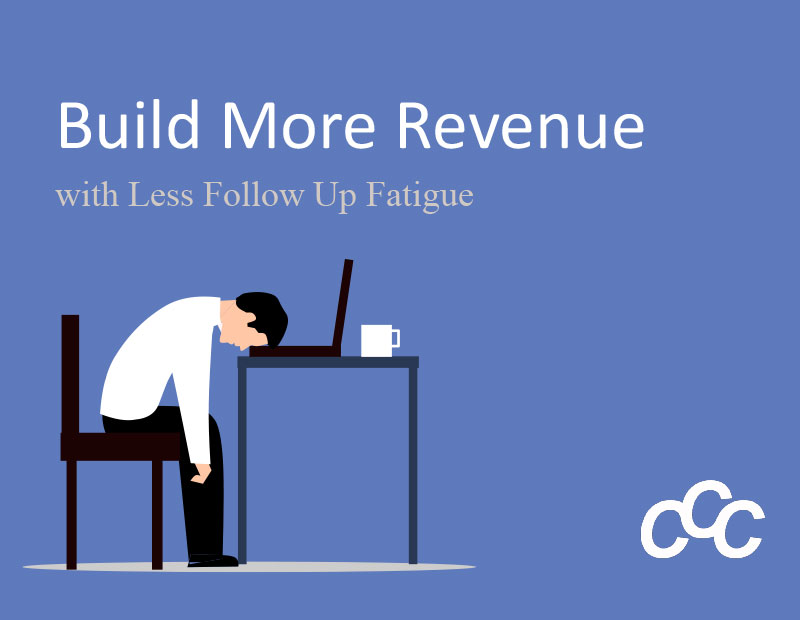[vc_row][vc_column][vc_column_text]CRM is a necessary tool for businesses and organizations that need to track and nurture their contacts. SmallBizGenius shares that “CRM revenues are expected to reach over $80 billion in 2025”. They also state that “Companies that use CRM successfully have improved sales by 29%.” The latter statistic reveals truth about CRMs. Just because you have a CRM, it does not mean it is helping you improve sales. Companies that properly implement a CRM and graft it into the DNA of their sales cycle as an essential tool for growth, close more sales with less follow up fatigue (FUF).
What does a successful CRM implementation look like? Well, let’s look first at what it does not look like. The business owners finally decide that the business needs a better way to track leads and nurture contacts, so they search online for a CRM. They choose a CRM, implement it, and then tell the salespeople to start using it.
What’s wrong with this picture? We’ll point out just a couple of issues right off the bat.
- The business owner did not involve the salespeople, upfront, in the research process.
- The CRM was implemented without defining CRM business goals first.
- The salespeople are told to use it without a unified direction or any training. Each to its own as they say.
What is the result? The sales cycle becomes even more fragmented with a new tool thrown into the mix. The business owners are frustrated that the CRM investment is becoming a costly asset instead of a profitable asset.
Thankfully, there is a right way to implement a CRM that will result in improved sales. Let’s take a look.
Do not make the decision yourself
A good and successful business owner or decision-maker knows that making big decisions should not be done in a silo. Select other individuals such as your top salesperson, your sales manager, and your administrative staff to help you research and find the right CRM. Using your business goals as a foundation along with valuable insights from your sales team, you will be able to make an informed decision. This will help with CRM company adoption and you are showing your team that you respect their input.
Define your CRM business goals
The purpose of a business goal is to help you attain what you want to accomplish. CRM business goals need to be specific. Answer a few questions with your implementation team to define your CRM goals: What do you want to achieve that you don’t do now (i.e. segment contacts into dynamic lists, outbound automation? What data you do want to track? What reports do you use now to track that information? Your CRM business goals include timeframes for completion to keep your implementation on schedule
Configure your CRM before using it
Implementing a CRM out of the box is not smart, because default settings may include features that you do not need or disable other features that you do need. It is a good idea to work with the CRM’s support team to configure the CRM according to your business goals. At CCC, we talk to our clients about their business goals and configure the CRM accordingly. As each client is unique, we tailor the CRM for our customers so that critical reports, email campaigns, and dynamic lists are created prior to your first log into the CRM. On day one, your CRM is configured, and we are ready to train you to manage your clients, prospects, and marketing actions.
Get your team on board
Once the CRM is configured and ready, your sales team needs to be trained as a group. Leaving them to learn on their own will bring unnecessary confusion and frustration. Training as a group allows them to learn together, ask questions collectively, understand goals and expectations, and walk away knowing they are on the same page. Onboarding as a team will encourage them to use the CRM together as a collaborative sales tool.
Provide ongoing support
Business goals, sales cycles, and CRM features may change or evolve over time. A smart decision during the CRM implementation is to establish an ongoing support contract with the CRM provider. Ongoing support will enable your sales team to call support for technical issues and ongoing training (for new salespeople) or refresher courses as needed throughout the year.
We see companies and organizations that implement a CRM the right way, grow, and improve sales. Their CRM becomes a profitable asset instead of a money-drainer. Their sales team is happier and work together better. If you are in the consideration stage of implementing a CRM or need a CRM, please contact us. We can talk with you about your business goals and help you and your team make the right decision.





